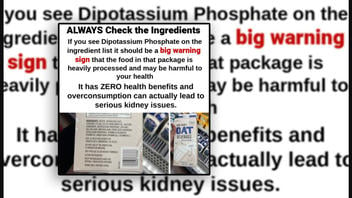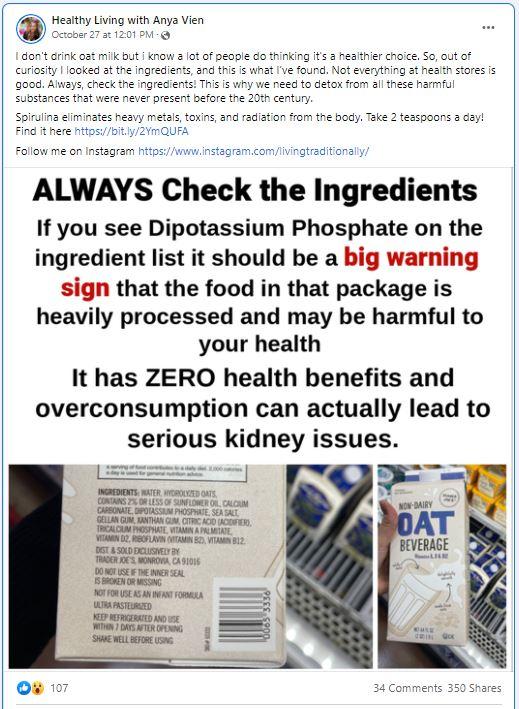
Does the presence of dipotassium phosphate in a food indicate that it is heavily processed and that it could harm your health? No. The Food and Drug Administration classifies this food additive as "Generally Recognized as Safe." The additive dipotassium phosphate is a manufactured salt compound. Both potassium and phosphorus are essential for the body's functioning and are found naturally in unprocessed foods. While some people with specific health concerns may be advised by their doctor to avoid these additives because they need to limit their potassium and phosphorus intake, this warning does not extend to the general population. Some individuals may choose a diet with fewer additives and processed foods, but the warning in this meme overstates the risk.
The claim reproduced here seems to have originated in a November 4, 2020, blogpost on a website selling plant-based creamers formulated with almonds, oats or hemp. The warning sentence, now coupled with photos of Trader Joe's Oat Beverage packaging, appears as a meme in a post published on Facebook on October 27, 2021. The text included of the meme reads:
ALWAYS Check the Ingredients
If you see Dipotassium Phosphate on the ingredient list it should be a big warning sign that the food in that package is heavily processed and may be harmful to your health
It has ZERO health benefits and overconsumption can actually lead to serious kidney issues.
This is how the post appeared on Facebook:
(Image source: Facebook screenshot taken on Tue Nov 02 21:33:33 2021 UTC)
The captioning above the meme image in this Facebook post contains an ad for an unrelated supplement. This fact check is only focused on the claims about dipotassium phosphate.
The body uses phosphorus for building bones and teeth and potassium is an electrolyte used by the body for nerve and muscle function. These minerals, far from having "zero health benefits" are essential to the body's functioning, although artificial food additives may introduce more phosphorus and potassium into the diet than is needed.
Lead Stories reached out by email to the National Kidney Foundation of Indiana to ask about concerns specific to kidney heath regarding this food additive. The Medical Advisory Board of the National Kidney Foundation of Indiana responded with this statement on November 3, 2021:
Dipotassium Phosphate is a food additive generally recognized as safe (GRAS) by the USFDA Food and Drug Administration. It is used as an emulsifier and stabilizer in non-dairy products. Individuals with kidney disease, in particular those receiving dialysis, often require strict limits on the amounts of potassium and phosphorus in their diets. Since specific diet recommendations can vary widely depending on the cause of kidney disease, each person is advised to contact their healthcare team for advice.
The section on dipotassium phosphate of the U.S. Code of Federal Regulations can be found here on the website of the U.S. Food and Drug Administration.
The nondairy oat beverage example shown in the photo is from Trader Joe's. A commenter posted a picture of a carton of Trader Joe's Oat Beverage which they recently purchased, which did not have the same long list of ingredients, only two -- water and hydrolyzed oats. Lead Stories reached out by email to Trader Joe's media contact to find out if there had been any recent changes which might account for this difference in labeling. Trader Joe's responded by email on November 3, 2021:
Thanks for reaching out. To confirm, at present, our refrigerated Oat Beverages contain dipotassium phosphate, while our shelf-stable (until opened, of course) Oat Beverages do not. We haven't changed the formula on any of them, so I suspect these customers were looking at two different Trader Joe's Oat Beverages.
















